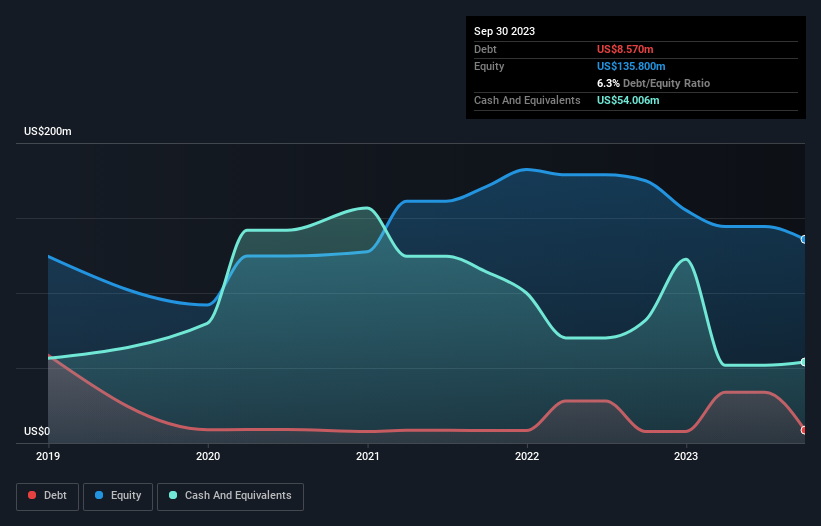- United States
- /
- Specialty Stores
- /
- NasdaqCM:NEGG
Is Newegg Commerce (NASDAQ:NEGG) Using Debt In A Risky Way?
Warren Buffett famously said, 'Volatility is far from synonymous with risk.' When we think about how risky a company is, we always like to look at its use of debt, since debt overload can lead to ruin. As with many other companies Newegg Commerce, Inc. (NASDAQ:NEGG) makes use of debt. But the more important question is: how much risk is that debt creating?
When Is Debt Dangerous?
Debt assists a business until the business has trouble paying it off, either with new capital or with free cash flow. In the worst case scenario, a company can go bankrupt if it cannot pay its creditors. However, a more usual (but still expensive) situation is where a company must dilute shareholders at a cheap share price simply to get debt under control. Of course, debt can be an important tool in businesses, particularly capital heavy businesses. The first thing to do when considering how much debt a business uses is to look at its cash and debt together.
View our latest analysis for Newegg Commerce
What Is Newegg Commerce's Debt?
The image below, which you can click on for greater detail, shows that at September 2023 Newegg Commerce had debt of US$8.57m, up from US$7.65m in one year. However, its balance sheet shows it holds US$54.0m in cash, so it actually has US$45.4m net cash.

How Strong Is Newegg Commerce's Balance Sheet?
We can see from the most recent balance sheet that Newegg Commerce had liabilities of US$210.4m falling due within a year, and liabilities of US$72.4m due beyond that. Offsetting these obligations, it had cash of US$54.0m as well as receivables valued at US$52.6m due within 12 months. So its liabilities outweigh the sum of its cash and (near-term) receivables by US$176.1m.
This deficit isn't so bad because Newegg Commerce is worth US$367.3m, and thus could probably raise enough capital to shore up its balance sheet, if the need arose. But we definitely want to keep our eyes open to indications that its debt is bringing too much risk. Despite its noteworthy liabilities, Newegg Commerce boasts net cash, so it's fair to say it does not have a heavy debt load! There's no doubt that we learn most about debt from the balance sheet. But it is Newegg Commerce's earnings that will influence how the balance sheet holds up in the future. So if you're keen to discover more about its earnings, it might be worth checking out this graph of its long term earnings trend.
Over 12 months, Newegg Commerce made a loss at the EBIT level, and saw its revenue drop to US$1.5b, which is a fall of 19%. We would much prefer see growth.
So How Risky Is Newegg Commerce?
By their very nature companies that are losing money are more risky than those with a long history of profitability. And in the last year Newegg Commerce had an earnings before interest and tax (EBIT) loss, truth be told. And over the same period it saw negative free cash outflow of US$43m and booked a US$74m accounting loss. However, it has net cash of US$45.4m, so it has a bit of time before it will need more capital. Summing up, we're a little skeptical of this one, as it seems fairly risky in the absence of free cashflow. The balance sheet is clearly the area to focus on when you are analysing debt. However, not all investment risk resides within the balance sheet - far from it. For instance, we've identified 2 warning signs for Newegg Commerce that you should be aware of.
If you're interested in investing in businesses that can grow profits without the burden of debt, then check out this free list of growing businesses that have net cash on the balance sheet.
Mobile Infrastructure for Defense and Disaster
The next wave in robotics isn't humanoid. Its fully autonomous towers delivering 5G, ISR, and radar in under 30 minutes, anywhere.
Get the investor briefing before the next round of contracts
Sponsored On Behalf of CiTechValuation is complex, but we're here to simplify it.
Discover if Newegg Commerce might be undervalued or overvalued with our detailed analysis, featuring fair value estimates, potential risks, dividends, insider trades, and its financial condition.
Access Free AnalysisHave feedback on this article? Concerned about the content? Get in touch with us directly. Alternatively, email editorial-team (at) simplywallst.com.
This article by Simply Wall St is general in nature. We provide commentary based on historical data and analyst forecasts only using an unbiased methodology and our articles are not intended to be financial advice. It does not constitute a recommendation to buy or sell any stock, and does not take account of your objectives, or your financial situation. We aim to bring you long-term focused analysis driven by fundamental data. Note that our analysis may not factor in the latest price-sensitive company announcements or qualitative material. Simply Wall St has no position in any stocks mentioned.
About NasdaqCM:NEGG
Newegg Commerce
Operates as an electronics-focused e-retailer in the United States, Canada, and internationally.
Excellent balance sheet with very low risk.
Similar Companies
Market Insights
Weekly Picks

THE KINGDOM OF BROWN GOODS: WHY MGPI IS BEING CRUSHED BY INVENTORY & PRIMED FOR RESURRECTION


Why Vertical Aerospace (NYSE: EVTL) is Worth Possibly Over 13x its Current Price


The Quiet Giant That Became AI’s Power Grid
Recently Updated Narratives


A case for USD $14.81 per share based on book value. Be warned, this is a micro-cap dependent on a single mine.

Occidental Petroleum to Become Fairly Priced at $68.29 According to Future Projections

Agfa-Gevaert is a digital and materials turnaround opportunity, with growth potential in ZIRFON, but carrying legacy risks.
Popular Narratives


MicroVision will explode future revenue by 380.37% with a vision towards success


Crazy Undervalued 42 Baggers Silver Play (Active & Running Mine)





